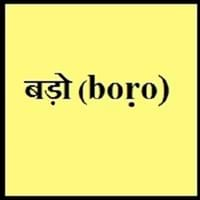Filipino vs Bodo
Countries
Philippines
Assam, India
National Language
Philippines
Assam, India
Second Language
Philippines
Not Available
Speaking Continents
Asia
Asia
Minority Language
Not spoken in any of the countries
Not Available
Regulated By
Komisyon sa Wikang Filipino
Not Available
Interesting Facts
- "Filipino" was officially declared as national language by the constitution in 1987.
- "Filipino" is the official name of Tagalog, or synonym of it.
- In ancient times, Bodo language was written using Assamese script and Roman script.
- Bodo Language is written using Devanagari script since 1963.
Similar To
Tagalog Language
Dimasa language, Garo language, Kokborok language
Derived From
Spanish Language
Not Available
Alphabets in
Filipino-Alphabets.jpg#200
Bodo-Alphabets.jpg#200
Writing Direction
Not Available
Not Available
Language Levels
Not Available
Time Taken to Learn
Not Available
Hello
Kumusta
Not Available
Thank You
Salamat
Not Available
How Are You?
Kumusta
Nungni khabora ma?
Good Night
magandang gabi
मोजां हर (Mwjang Hor)
Good Evening
Magandang gabi
Not Available
Good Afternoon
Magandang hapon
Not Available
Good Morning
Magandang umaga
मोजां फुं (Mwjang Fung)
Please
Mangyaring
अननानै (Onnanwi)
Sorry
pinagsisisihan
Not Available
I Love You
Mahal kita
अननाइ नों (onnai Nwng)
Excuse Me
patawarin ninyo ako
Not Available
Dialect 1
Bikol
(Sønabari) Western Boro dialect
Where They Speak
Philippines
Bongaigaon, Kokrajhar
Dialect 2
Hiligaynon
(Sanzari) Eastern Boro dialect
Where They Speak
Philippines
Barpeta, Darrang, Kamrup, Nalbari
How Many People Speak
Not Available
Dialect 3
Waray
(Hazari) Southern Boro dialect
Where They Speak
Philippines
Assam, India, Nepal
How Many People Speak
Not Available
Speaking Population
Not Available
Not Available
Second Language Speakers
Not Available
Native Name
filipino
बड़ो (boṛo)
Alternative Names
Pilipino
Bara, Bodi, Boro, Boroni, Kachari, Mech, Meche, Mechi, Meci
French Name
filipino; pilipino
Not Available
German Name
Pilipino
Not Available
Pronunciation
[ˌfɪl.ɪˈpiː.no]
[bɔɽo]
Ethnicity
Not Available
Bodo, Mech, (Assamese)
Language Family
Austronesian Family
Sino-Tibetan Family
Subgroup
Not Available
Tibeto-Burman
Branch
Not Available
Not Available
Early Forms
No early forms
Not Available
Standard Forms
Filipino
Not Available
Signed Forms
Not Available
Not Available
Scope
Individual
Individual
ISO 639 1
No Data Available
Not Available
ISO 639 2/T
fil
Not Available
ISO 639 2/B
fil
Not Available
ISO 639 6
Not Available
Not Available
Glottocode
fili1244
bodo1269
Linguasphere
No Data Available
Not Available
Language Type
Living
Living
Language Linguistic Typology
Not Available
Not Available
Language Morphological Typology
Not Available
Not Available
Filipino and Bodo Language History
Comparison of Filipino vs Bodo language history gives us differences between origin of Filipino and Bodo language. History of Filipino language states that this language originated in 16th Century whereas history of Bodo language states that this language originated in 1913. Family of the language also forms a part of history of that language. More on language families of these languages can be found out on Filipino and Bodo Language History.
Filipino and Bodo Greetings
People around the world use different languages to interact with each other. Even if we cannot communicate fluently in any language, it will always be beneficial to know about some of the common greetings or phrases from that language. This is where Filipino and Bodo greetings helps you to understand basic phrases in Filipino and Bodo language. Filipino word for "Hello" is Kumusta or Bodo word for "Thank You" is Not Available. Find more of such common Filipino Greetings and Bodo Greetings. These greetings will help you to be more confident when conversing with natives that speak these languages.
Filipino vs Bodo Difficulty
The Filipino vs Bodo difficulty level basically depends on the number of Filipino Alphabets and Bodo Alphabets. Also the number of vowels and consonants in the language plays an important role in deciding the difficulty level of that language. The important points to be considered when we compare Filipino and Bodo are the origin, speaking countries, language family, different greetings, speaking population of these languages. Want to know in Filipino and Bodo, which language is harder to learn? Time required to learn Filipino is 44 weeks while to learn Bodo time required is Not Available.





